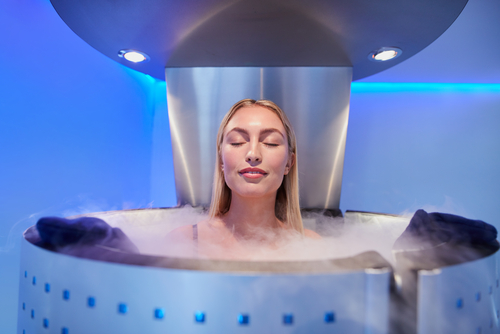Exposure to extreme cold can help improve the quality of life in fibromyalgia patients by reducing musculoskeletal pain and inflammation, according to a clinical trial.
Results of the trial suggest that whole body cold-based therapy, called cryotherapy, should be considered as a treatment for fibromyalgia.
The study, “Effect of whole body cryotherapy interventions on health-related quality of life in fibromyalgia patients: A randomized controlled trial,” was published in Complementary Therapies in Medicine.
Cold has been shown to reduce pain and inflammation in many conditions, including rheumatic diseases and fibromyalgia. Cryotherapy has been shown to provide short-term pain relief in fibromyalgia patients.
Whole body cryotherapy is designed to trigger thermal stress that will promote blood vessel constriction and slow nerve signals, resulting in pain relief.
To better understand the potential benefits of cryotherapy for fibromyalgia patients, a team led by researchers at University of Reims Champagne-Ardenne in France conducted a randomized, controlled trial.
Participants included 24 adults with fibromyalgia who were randomized to undergo either whole body cryotherapy or not (these patients were called the control group). All patients underwent physiotherapy during the study period.
Patients in the cryotherapy group were exposed to extreme cold for three minutes at minus 110 degrees C (equal to minus 166 degrees Farenheit) in MECOTEC’s cryoair whole body cryotherapy chamber during 10 treatment sessions over eight days. All sensitive parts of the body, such as the face, ears, feet, and hands, were protected to avoid tissue damage.
All participants were asked to complete a quality of life questionnaire before treatment began and again one month after the final session.
Participants in the cryotherapy group reported significantly improved physical and mental health scores, compared with the baseline, or before treatment began.
The mean physical score improved from 21.3 to 55.6, and the mean mental health score from 30.1 to 60.4, whereas the control group did not have any significant changes in values.
“With few whole body cryotherapy sessions, rapid improvements have occurred both in the mental and physical dimensions of patients’ quality of life,” the researchers said.
Additional studies are still warranted to evaluate the long-term benefits of whole body cryotherapy for treating fibromyalgia. Since this therapeutic strategy has been demonstrated to improve sleep quality, further studies should address if whole body cryotherapy could improve sleep patterns in patients with the disease, the researchers said.

